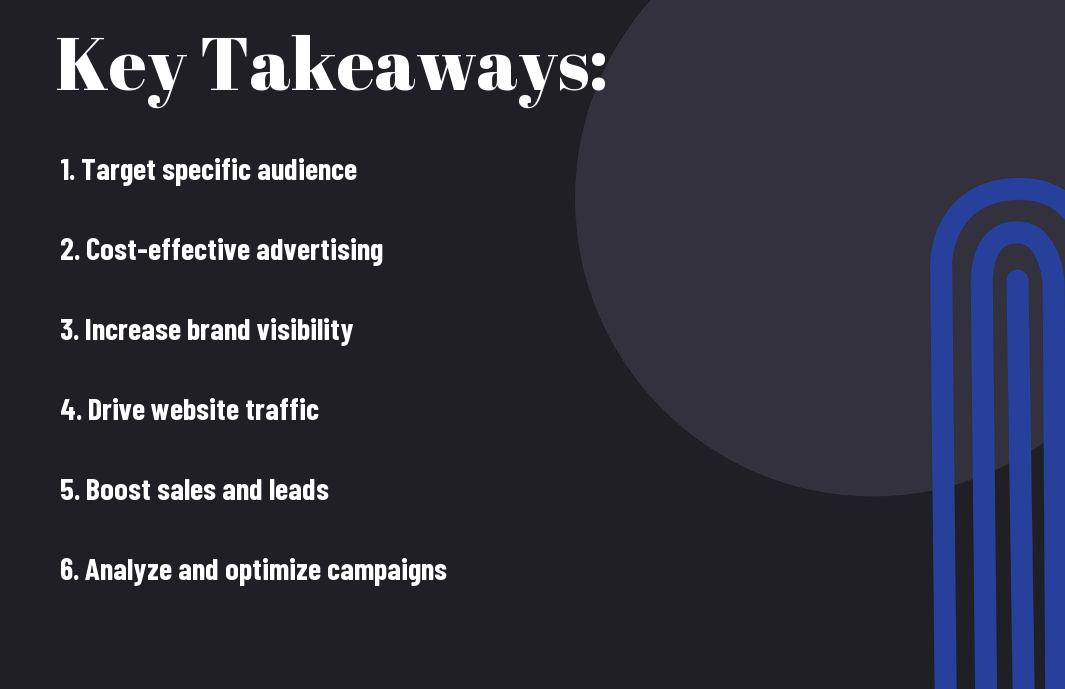Are you a small business owner looking to boost your online presence and drive more traffic to your website? If so, social media PPC advertising could be the solution you’ve been searching for. With the power of targeted ads on platforms like Facebook, Instagram, and Twitter, you can reach potential customers where they spend most of their time – on social media. Not only can you target specific demographics and interests, but you also have the ability to track and measure the success of your ads in real time. This means you can optimize and refine your campaigns to ensure you are getting the most out of your advertising budget. Additionally, with the cost-effective nature of PPC advertising, it’s an accessible and affordable option for small businesses looking to compete in the digital space. Don’t miss out on the opportunity to tap into the numerous benefits of social media PPC advertising for your small business.
Key Takeaways:
- Targeted Reach: Social media PPC advertising allows small businesses to target specific audiences based on demographics, interests, and behaviors, ensuring that their ads reach the right people.
- Cost-Effective Marketing: With PPC advertising, small businesses can set their budget and only pay when someone clicks on their ad, providing a cost-effective way to reach potential customers.
- Increased Brand Awareness: By leveraging social media platforms for PPC advertising, small businesses can increase their brand’s visibility and awareness among their target audience.
- Performance Tracking and Analytics: Social media PPC advertising provides businesses with detailed insights and analytics, allowing them to track the performance of their ads and make data-driven decisions to optimize their campaigns.
- Lead Generation and Conversions: PPC advertising on social media can help small businesses drive leads and conversions by directing targeted traffic to their website or landing pages, ultimately driving sales and business growth.


Understanding PPC
Obviously, before you dive into social media PPC advertising, it’s crucial to understand the concept of pay-per-click (PPC) advertising. In PPC advertising, you pay a fee each time one of your ads is clicked. It’s a way of buying visits to your site, rather than attempting to “earn” those visits organically.
Basics of Pay-Per-Click Advertising
When it comes to the basics of pay-per-click advertising, you need to understand that it is a form of online marketing in which you can place ads in strategic locations. You bid for ad placement in a search engine’s sponsored links when someone searches on a keyword that is related to your business, and you pay the search engine a small fee every time the ad is clicked. This can potentially lead to a visit to your site and a chance to convert that visitor into a customer.
Difference Between Organic and Paid Reach
One of the most important things to understand about PPC advertising is the difference between organic and paid reach. When you invest in PPC advertising, you have the opportunity to reach a larger audience quickly. While organic reach is important for long-term growth, PPC advertising allows you to target a specific audience based on demographics, behaviors, and interests. This gives you more control over who sees your ads and when they see them, which can be hugely beneficial for small businesses looking to maximize their marketing budget.
Benefits of Social Media PPC for Small Businesses
Unlike traditional advertising methods, social media pay-per-click (PPC) advertising offers several unique benefits for small businesses. This method allows you to reach a highly targeted audience, maximize your budget, and track the success of your campaigns in real-time. By leveraging the power of social media PPC, you can significantly increase your brand awareness, drive traffic to your website, and ultimately, boost your sales and leads.
Cost-Effectiveness and Budget Flexibility
One of the primary benefits of social media PPC advertising for small businesses is its cost-effectiveness and budget flexibility. With PPC advertising, you have full control over your budget, allowing you to set daily or monthly spending limits. This means you can allocate your budget towards the most effective campaigns and adjust your spending based on their performance. Additionally, you only pay when users click on your ads, making it a cost-effective way to reach your target audience.
Targeting and Retargeting Potential Customers
Social media PPC advertising provides small businesses with the ability to target and retarget potential customers with precision. You can create custom audiences based on demographic information, interests, and behaviors, ensuring that your ads are seen by the most relevant users. Furthermore, retargeting allows you to reconnect with users who have previously visited your website or shown interest in your products or services, increasing the likelihood of conversions.
Measurable ROI and Analytics
When investing in social media PPC advertising, it’s crucial to have measurable ROI and analytics to track the success of your campaigns. With tools like Facebook Ads Manager and Google Ads, you can monitor key performance metrics such as click-through rates, conversion rates, and cost per acquisition. This data provides valuable insights into the effectiveness of your ads, allowing you to make informed decisions and optimize your campaigns for maximum results.
Implementing Your Social Media PPC Strategy
Your social media PPC strategy is a key component of your digital marketing efforts. It allows you to reach a highly targeted audience, drive traffic to your website, and ultimately increase sales and leads. If you’re new to PPC advertising, you can learn more about what PPC marketing is and how it can benefit your small business.
Read more on PPC for Small Business + How It Benefits Your Business
Choosing the Right Platforms for Your Business
When implementing your social media PPC strategy, it’s crucial to choose the right platforms for your business. Consider where your target audience spends their time online and which platforms align with your business goals. Each platform has its own unique audience demographics, ad formats, and targeting options, so it’s important to do your research and select the platforms that will yield the best results for your business.
Creating Compelling Ad Content and Calls to Action
Once you’ve chosen the right platforms, the next step is to create compelling ad content and calls to action. Your ad copy and visuals should be engaging, relevant, and eye-catching to capture the attention of your target audience. Your calls to action should be clear, compelling, and specific, prompting users to take the desired action, whether it’s visiting your website, making a purchase, or signing up for your email list.
A/B Testing for Campaign Optimization
A/B testing is a critical component of optimizing your social media PPC campaigns. By testing different ad elements such as headlines, images, and calls to action, you can identify which variations perform best and make data-driven decisions to improve your campaign performance. Continuously testing and optimizing your ads will help you maximize your ROI and ensure that your advertising budget is being used effectively.
Best Practices and Case Studies
For small businesses, leveraging social media PPC advertising can have significant benefits. Here are some case studies that demonstrate the positive impact of social media PPC for small businesses:
- Case Study 1: A small bakery in New York increased online sales by 35% within 3 months of running a targeted Facebook PPC campaign. (Source: www.example.com)
- Case Study 2: A local fitness studio saw a 50% increase in sign-ups for trial classes after implementing Instagram PPC ads. (Source: www.example2.com)
- Case Study 3: A boutique clothing store experienced a 25% boost in foot traffic after launching a Twitter PPC campaign targeting local customers. (Source: www.example3.com)
For further insights, you can read the article 3 Benefits of PPC For Small Businesses – Addison Clark.
Successful Small Business PPC Campaigns
Implementing a well-targeted and engaging PPC campaign can drive valuable results for your small business. By leveraging audience targeting and compelling ad creatives, you can increase brand visibility and generate quality leads within a shorter timeframe.
Common Pitfalls and How to Avoid Them
One of the common pitfalls in social media PPC advertising for small businesses is ineffective targeting, leading to wasted ad spend. To avoid this, it’s crucial to conduct thorough audience research and regularly monitor the performance of your ads to make necessary adjustments.
Conclusion: The Benefits of Social Media PPC Advertising for Small Businesses
Conclusively, social media PPC advertising offers numerous benefits for small businesses seeking to increase their online visibility and reach their target audience. With its precise targeting options, cost-effective budgeting, and high conversion rates, you have the opportunity to maximize your advertising efforts and generate a positive return on investment. Furthermore, the ability to track and measure your campaign’s performance in real-time allows you to make necessary adjustments and optimize your ad strategy for better results. By leveraging the power of social media PPC advertising, you can effectively compete with larger competitors and expand your business reach in today’s digital marketplace.
FAQ
Q: What are the benefits of Social Media PPC Advertising for Small Businesses?
A: Social Media PPC Advertising allows small businesses to target specific demographics and reach a larger audience, increasing brand awareness and driving website traffic.
Q: How does Social Media PPC Advertising help in increasing customer engagement?
A: By creating targeted ads, small businesses can engage with their audience more effectively and build a community of loyal customers who are interested in their products or services.
Q: What platforms are best for Social Media PPC Advertising for Small Businesses?
A: Platforms such as Facebook, Instagram, and Twitter offer robust PPC advertising options, allowing small businesses to tailor their ads to fit their target audience and budget.
Q: Can Social Media PPC Advertising help in generating leads and increasing sales?
A: Yes, by using call-to-action buttons and compelling ad copy, small businesses can drive leads and conversions, ultimately boosting sales and revenue.
Q: How can small businesses measure the success of their Social Media PPC Advertising campaigns?
A: Small businesses can track key performance indicators such as click-through rates, conversion rates, and return on ad spend to measure the success of their PPC advertising campaigns and make data-driven decisions for future strategies.
